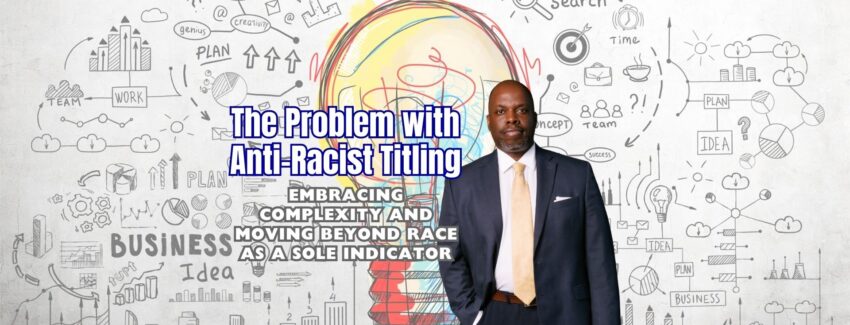Embracing Complexity and Moving Beyond Race as a Sole Indicator
The issue with anti-racist titling lies in the underlying assumption that race is a clear-cut, defining attribute when, in reality, it is not. While race has played a significant role in shaping societal hierarchies and dynamics throughout history, using race as a singular marker for categorizing individuals falls short of capturing the true complexity of human diversity. This narrow approach fails to account for the rich ethnic, cultural, and personal backgrounds, as well as the wide range of self-expression found among individuals.
It is essential to recognize that progress toward a more inclusive and equitable society requires a broader perspective that acknowledges the multifaceted nature of human experiences and identities. This shift in perspective not only challenges the traditional paradigms of race but also seeks a more meaningful, dynamic, and nuanced understanding of human diversity.
Revisiting Anna Freud's Personality Types
It may be helpful to reconsider the psychological theories of Elizabeth Young-Bruehl and Anna Freud, Sigmund Freud's daughter, on personality types. While this framework has been criticized for not capturing the full complexity of human personality, its appreciation for the underlying dynamics and interplay of personal traits, emotions, and social interactions might provide a more accurate representation for understanding diversity than a focus on race alone. And that's the point, to look for more predictive and impactful constructs beyond race.
Anna Freud's approach, which emphasizes the importance of the psychological realm in shaping human experiences, offers a potential alternative to static categories of race. By delving into the intricate and fluid aspects of identity, such as the interplay of psychological and social factors, we can better understand human diversity and promote a more inclusive and equitable society.
IDEA: Inclusion, Diversity, Equity, and Accessibility as a Replacement for Anti-Racist Titling
A more comprehensive approach to addressing inequality and promoting inclusion is by adopting the IDEA framework, which stands for Inclusion, Diversity, Equity, and Accessibility. This framework expands beyond race-focused initiatives to tackle additional dimensions of diversity and foster an environment that supports the well-being and success of all individuals, regardless of their background.
The IDEA framework not only encompasses various forms of diversity, such as ethnicity, culture, gender, ability, and socioeconomic status, but also emphasizes the need for accessible opportunities and resources for all. By working towards an inclusive and equitable society through IDEA initiatives, we strive to go beyond addressing racism and challenge the larger systems that perpetuate discrimination and marginalization.
Embracing Cognitive Flexibility and Creativity to Foster Cultural Humility
Cultural humility plays a crucial role in promoting diversity and inclusion, as it requires individuals to embrace cognitive flexibility and creativity, key components of empathy and understanding. Cultural humility involves being aware of one's own biases, privilege, and limitations, as well as being willing to learn from others, engaging in open dialogue, and appreciating the vast array of experiences and perspectives that exist in the world.
Cognitive flexibility allows individuals to shift their perspectives, entertain differing viewpoints, and approach situations with an open mind. Coupled with creativity, this flexibility enables individuals to engage with others in meaningful and authentic ways, fostering mutual understanding, respect, and empathy. These skills are essential in promoting an inclusive environment where everyone feels valued and heard.
Strategies for Encouraging Cognitive Flexibility, Creativity, and Cultural Humility
The following strategies can be employed to foster a mindset of cognitive flexibility, creativity, and cultural humility, ultimately promoting an inclusive and diverse environment:
- Exposure to diverse experiences and perspectives: Encourage individuals to interact with people from different backgrounds, engage in new experiences, and immerse themselves in a variety of social, cultural, and intellectual contexts.
- Education and self-awareness: Provide educational resources on the complexities of identity, diversity, and intersectionality, and encourage self-reflection on personal biases, privilege, and assumptions.
- Mindfulness practices: Promote mindfulness techniques, such as meditation, which foster greater self-awareness, empathy, and cognitive flexibility.
- Skill-building workshops: Organize workshops, seminars, and training sessions that focus on developing empathy, active listening, and communication skills, which will enable individuals to engage with diverse individuals effectively.
- Collaborative problem-solving: Encourage problem-solving activities that involve diverse perspectives and require collective efforts, empowering individuals to learn from one another and build collaborative relationships.
By embracing the complexity of human diversity and moving beyond race as the sole indicator for categorizing individuals, we create a more inclusive and equitable environment. Adopting the IDEA framework, revisiting Anna Freud's personality types, and fostering cognitive flexibility, creativity, and cultural humility pave the way for change that breaks down barriers, fosters understanding, and champions the rich array of human experiences.

